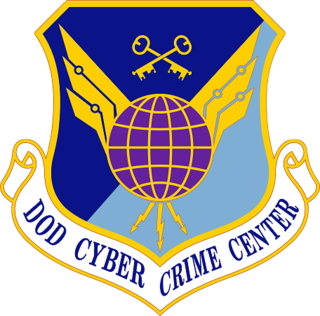LexisNexis Risk Solutions is a global data and analytics company that provides data and technology services, analytics, predictive insights, and fraud prevention for a wide range of industries. It is headquartered in Alpharetta, Georgia, and has offices throughout the U.S. and in Australia, Brazil, China, France, Hong Kong SAR, India, Ireland, Israel, the Philippines, and the United Kingdom.

An Amber alert or a child abduction emergency alert is a message distributed by a child abduction alert system to ask the public for help in finding abducted children. The system originated in the United States of America.

Cybercrime encompasses a wide range of criminal activities that are carried out using digital devices and/or networks. These crimes involve the use of technology to commit fraud, identity theft, data breaches, computer viruses, scams, and expanded upon in other malicious acts. Cybercriminals exploit vulnerabilities in computer systems and networks to gain unauthorized access, steal sensitive information, disrupt services, and cause financial or reputational harm to individuals, organizations, and governments.

The Serious Organised Crime Agency (SOCA) was a non-departmental public body of the Government of the United Kingdom which existed from 1 April 2006 until 7 October 2013. SOCA was a national law enforcement agency with Home Office sponsorship, established as a body corporate under Section 1 of the Serious Organised Crime and Police Act 2005. It operated within the United Kingdom and collaborated with many foreign law enforcement and intelligence agencies.
The Behavioral Analysis Unit (BAU) is a department of the Federal Bureau of Investigation's National Center for the Analysis of Violent Crime that uses behavioral analysts to assist in criminal investigations. Their mission is to provide behavioral-based investigative and/or operational support by applying case experience, research, and training to complex and time-sensitive crimes, typically involving acts or threats of violence.
The Australian High Tech Crime Centre (AHTCC) are hosted by the Australian Federal Police (AFP) at their headquarters in Canberra. Under the auspices of the AFP, the AHTCC is party to the formal Joint Operating Arrangement established between the AFP, the Australian Security Intelligence Organisation and the Computer Network Vulnerability Team of the Australian Signals Directorate.

The Australian Criminal Intelligence Commission (ACIC) is a law enforcement agency established by the Australian federal government on 1 July 2016, following the merger of the Australian Crime Commission (ACC) and CrimTrac. It has specialist investigative capabilities and delivers and maintains national information sharing systems. ACIC is part of the National Intelligence Community.
CrimTrac was a former Agency in the Attorney-General's Department that was merged with the Australian Crime Commission on 1 July 2016 to form the Australian Criminal Intelligence Commission. Crimtrac had been responsible for developing and maintaining national information-sharing services between state, territory and federal law enforcement agencies.
The National Center for Missing & Exploited Children (NCMEC) is a private, nonprofit organization established in 1984 by the United States Congress. In September 2013, the United States House of Representatives, United States Senate, and the President of the United States reauthorized the allocation of $40 million in funding for the organization as part of Missing Children's Assistance Reauthorization Act of 2013. The current chair of the organization is Jon Grosso of Kohl's. NCMEC handles cases of missing minors from infancy to young adults through age 20.
Criminal intelligence is information compiled, analyzed, and/or disseminated in an effort to anticipate, prevent, or monitor criminal activity.

Digital forensics is a branch of forensic science encompassing the recovery, investigation, examination, and analysis of material found in digital devices, often in relation to mobile devices and computer crime. The term "digital forensics" was originally used as a synonym for computer forensics but has expanded to cover investigation of all devices capable of storing digital data. With roots in the personal computing revolution of the late 1970s and early 1980s, the discipline evolved in a haphazard manner during the 1990s, and it was not until the early 21st century that national policies emerged.

The Federal Criminal Police Office of Germany is the federal investigative police agency of Germany, directly subordinated to the Federal Ministry of the Interior. It is headquartered in Wiesbaden, Hesse, and maintains major branch offices in Berlin and Meckenheim near Bonn. It has been headed by Holger Münch since December 2014.

The Child Exploitation and Online Protection Command, or CEOP Command, is a command of the UK's National Crime Agency (NCA), and is tasked to work both nationally and internationally to bring online child sex offenders, including those involved in the production, distribution and viewing of child abuse material, to the UK courts. The centre was formed in April 2006 as the Child Exploitation and Online Protection Centre, and was absorbed into the NCA on 7 October 2013 by the Crime and Courts Act 2013.

Transnational organized crime (TOC) is organized crime coordinated across national borders, involving groups or markets of individuals working in more than one country to plan and execute illegal business ventures. In order to achieve their goals, these criminal groups use systematic violence and corruption. Common transnational organized crimes include conveying drugs, conveying arms, trafficking for sex, toxic waste disposal, materials theft and poaching.
The International Centre for Missing & Exploited Children (ICMEC), headquartered in Alexandria, Virginia, USA, with a regional presence in the United Kingdom, Europe, Turkey, Africa, Canada, Mexico, Brazil, Caribbean, Southeast Asia, India, Japan, South Korea, Taiwan and Australasia, is a private 501(c)(3) non-governmental, nonprofit global organization. It combats child sexual exploitation, child pornography, child trafficking and child abduction.
Criminal Intelligence Service Canada is an inter-agency organization in Canada designed to coordinate and share criminal intelligence amongst member police forces. Established in 1970, the CISC has a central bureau in Ottawa and ten bureaus in each province offering services to over 400 law enforcement agencies in Canada.

The Department of Defense Cyber Crime Center (DC3) is designated as a Federal Cyber Center by National Security Presidential Directive 54/Homeland Security Presidential Directive 23, as a Department of Defense (DoD) Center Of Excellence for Digital and Multimedia (D/MM) forensics by DoD Directive 5505.13E, and serves as the operational focal point for the Defense Industrial Base (DIB) Cybersecurity program. DC3 operates as a Field Operating Agency (FOA) under the Inspector General of the Department of the Air Force.

The National Crime Agency (NCA) is a national law enforcement agency in the United Kingdom. It is the UK's lead agency against organised crime; human, weapon and drug trafficking; cybercrime; and economic crime that goes across regional and international borders, but it can be tasked to investigate any crime. The NCA has a strategic role as part of which it looks at serious crime in aggregate across the UK, especially analysing how organised criminals are operating and how they can be disrupted. To do this, it works closely with regional organised crime units (ROCUs), local police forces, and other government departments and agencies.

The Microsoft Digital Crimes Unit (DCU) is a Microsoft sponsored team of international legal and internet security experts employing the latest tools and technologies to stop or interfere with cybercrime and cyber threats. The Microsoft Digital Crimes Unit was assembled in 2008. In 2013, a Cybercrime center for the DCU was opened in Redmond, Washington. There are about 100 members of the DCU stationed just in Redmond, Washington at the original Cybercrime Center. Members of the DCU include lawyers, data scientists, investigators, forensic analysts, and engineers. The DCU has international offices located in major cities such as: Beijing, Berlin, Bogota, Delhi, Dublin, Hong Kong, Sydney, and Washington, D.C. The DCU's main focuses are child protection, copyright infringement and malware crimes. The DCU must work closely with law enforcement to ensure the perpetrators are punished to the full extent of the law. The DCU has taken down many major botnets such as the Citadel, Rustock, and Zeus. Around the world malware has cost users about $113 billion and the DCU's jobs is to shut them down in accordance with the law.
Cybersex trafficking, live streaming sexual abuse, webcam sex tourism/abuse or ICTs -facilitated sexual exploitation is a cybercrime involving sex trafficking and the live streaming of coerced sexual acts and/or rape on webcam.









